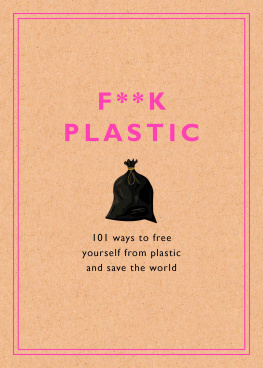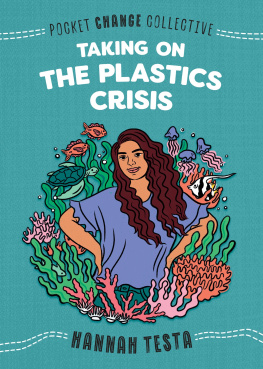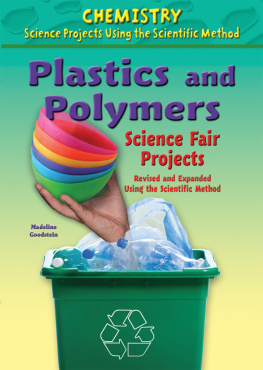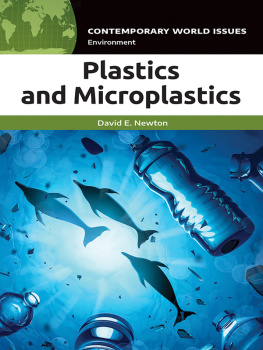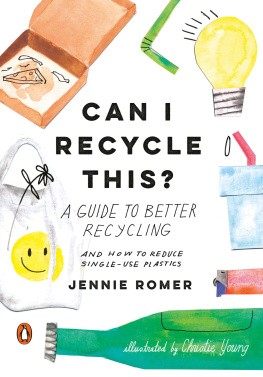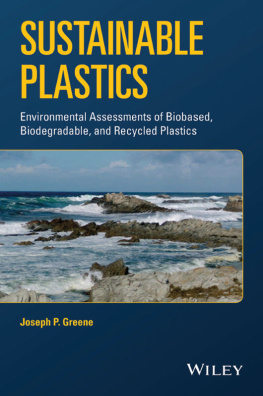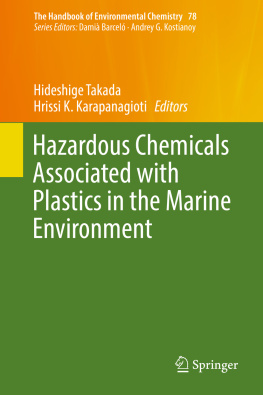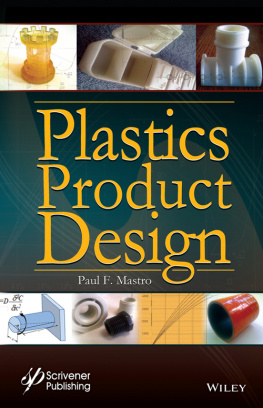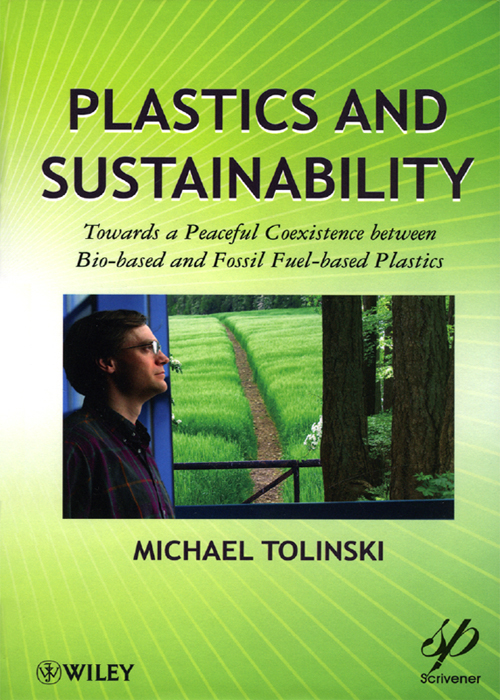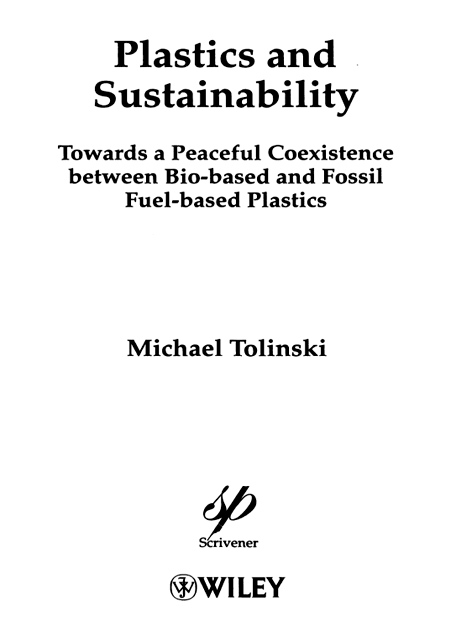Plastics and Sustainability
Scrivener Publishing
3 Winter Street, Suite 3
Salem, MA 01970
Scrivener Publishing Collections Editors
James E. R. Couper
Richard Erdlac
Norman Lieberman
W. Kent Muhlbauer
S. A. Sherif
Ken Dragoon
Rafiq Islam
Peter Martin
Andrew Y. C. Nee
James G. Speight
Publishers at Scrivener
Martin Scrivener ()
Phillip Carmical ()
Copyright 2012 by Scrivener Publishing LLC. All rights reserved.
Co-published by John Wiley & Sons, Inc. Hoboken, New Jersey, and Scrivener Publishing LLC, Salem, Massachusetts.
Published simultaneously in Canada.
No part of this publication may be reproduced, stored in a retrieval system, or transmitted in any form or by any means, electronic, mechanical, photocopying, recording, scanning, or otherwise, except as permitted under Section 107 or 108 of the 1976 United States Copyright Act, without either the prior written permission of the Publisher, or authorization through payment of the appropriate per-copy fee to the Copyright Clearance Center, Inc., 222 Rosewood Drive, Danvers, MA 01923, (978) 750-8400, fax (978) 750-4470, or on the web at www.copyright.com . Requests to the Publisher for permission should be addressed to the Permissions Department, John Wiley & Sons, Inc., 111 River Street, Hoboken, NJ 07030, (201) 748-6011, fax (201) 748-6008, or online at http://www.wiley.com/go/permission .
Limit of Liability/Disclaimer of Warranty: While the publisher and author have used their best efforts in preparing this book, they make no representations or warranties with respect to the accuracy or completeness of the contents of this book and specifically disclaim any implied warranties of merchantability or fitness for a particular purpose. No warranty may be created or extended by sales representatives or written sales materials. The advice and strategies contained herein may not be suitable for your situation. You should consult with a professional where appropriate. Neither the publisher nor author shall be liable for any loss of profit or any other commercial damages, including but not limited to special, incidental, consequential, or other damages.
For general information on our other products and services or for technical support, please contact our Customer Care Department within the United States at (800) 762-2974, outside the United States at (317) 572-3993 or fax (317) 572-4002.
Wiley also publishes its books in a variety of electronic formats. Some content that appears in print may not be available in electronic formats. For more information about Wiley products, visit our web site at www.wiley.com .
For more information about Scrivener products please visit www.scrivenerpublishing.com .
Cover design by Russell Richardson
Library of Congress Cataloging-in-Publication Data:
ISBN 978-0-470-93878-2
Acknowledgements
Solving problems related to the sustainability issues surrounding plastics must be a collaborative process if it is to be fruitful. This book acknowledges that need for collaboration by referencing the research and arguments of hundreds of industry professionals who have studied and/or reported on sustainability issues over recent years. These professionals often address difficult, critical technical issues that are typically not reported on by the mainstream press, but which are essential for understanding the overall argument about plastics and sustainability. I appreciate the commitment of these people; their work is admirable, especially the efforts of those who have presented complex views on sustainability while still trying to balance the interests of all stakeholders.
I also want to thank the editorial staffs at the Society of Plastics Engineers and John Wiley & Sons in Hoboken, who over the past eight years have often given me free rein to focus my articles for Plastics Engineering magazine on sustainability issues in the industry. The research required greatly aided me in creating this book. I also wish to thank those who commented on early drafts of the book, and my publisher Martin Scrivener for his interest, helpful guidance, and patience.
Preface
Years ago, after my first career as a manufacturing and materials engineer in the automotive industry, I started working as a trade journalist covering the plastics industry. I was eager to demonstrate my experience working with plastics in durable automotive applications, though I wasnt really comfortable with the ways plastics were used for packaging and other disposable applications. In one of our first meetings for a new (and short-lived) plastics magazine, I remember confessing that I wasnt thrilled to be writing about a technology that produces billions of margarine tubs and disposable stuff.
A much more experienced senior editor shook his head and responded solemnly with what I think was meant to be a correction and a lesson for me to learn: Its not our job to pass judgment on whether certain technologies in the industry are appropriate or inappropriate to cover. In terms of magazine publishing, he was right after all. Trade magazines in particular depend on advertising revenue from various companies they report on, and any magazine professing to cover the plastics industry inclusively should report on all its applications and machinery. I guess I even kept this lesson in mind when I was writing my first book, which focused on polyolefins the family of polymers from which those margarine tubs are made.
But now the situation seems different. Questions arise daily in the public discourse and within the industry itself about the environmental footprint or appropriateness of certain materials and technologies. More and more often, these decisions revolve around the concept of environmental sustainability.
Some arguments about the environmental impacts of plastics, though outwardly based on facts and logic, are, at their core, based on values and emotion. Aside from their technical prowess, plastics industry people are proud of the capabilities of their products and of the unique qualities of plastics, compared with other materials. They have spent their careers perfecting technology intended to make daily life better for billions of people. On the extreme other side, environmental activists are particularly sensitive to the waste of resources and the damage to the earths systems that can be created by technological society. And they are sensitive to the effects of industrial materials on children and future generations (or they may simply wish to avoid plastics for aesthetic or philosophical reasons).
The plastics industrys positions usually focus on defining the true level of risk or danger that environmental researchers raise about plastics (though certainly there are always holes to be poked in any study). According to their positions on various issues raised about plastics and the environment, each side has developed its own network of organizations that study the environmental effects of plastics. These groups publish reports, lobby governments for/against new laws, and use the mass media (and social media) to present their case.
In these kinds of disputes, each side argues for the legitimacy of its positions, conclusions, and test data. But care must be taken when using their information in making conclusions, given the possible biases that may influence each study. For this reason, this text avoids, as much as possible, referencing studies that seem excessively and intentionally biased. When a source seems like it could be biased, the text makes the source obvious in the text where it is referenced, so that the reader can consider any potential bias in the source material while reading. (And when the sources are not mentioned in the text, readers can refer to the authors or authoring organizations of each source in the references lists; most of these source materials are easily available online.)


